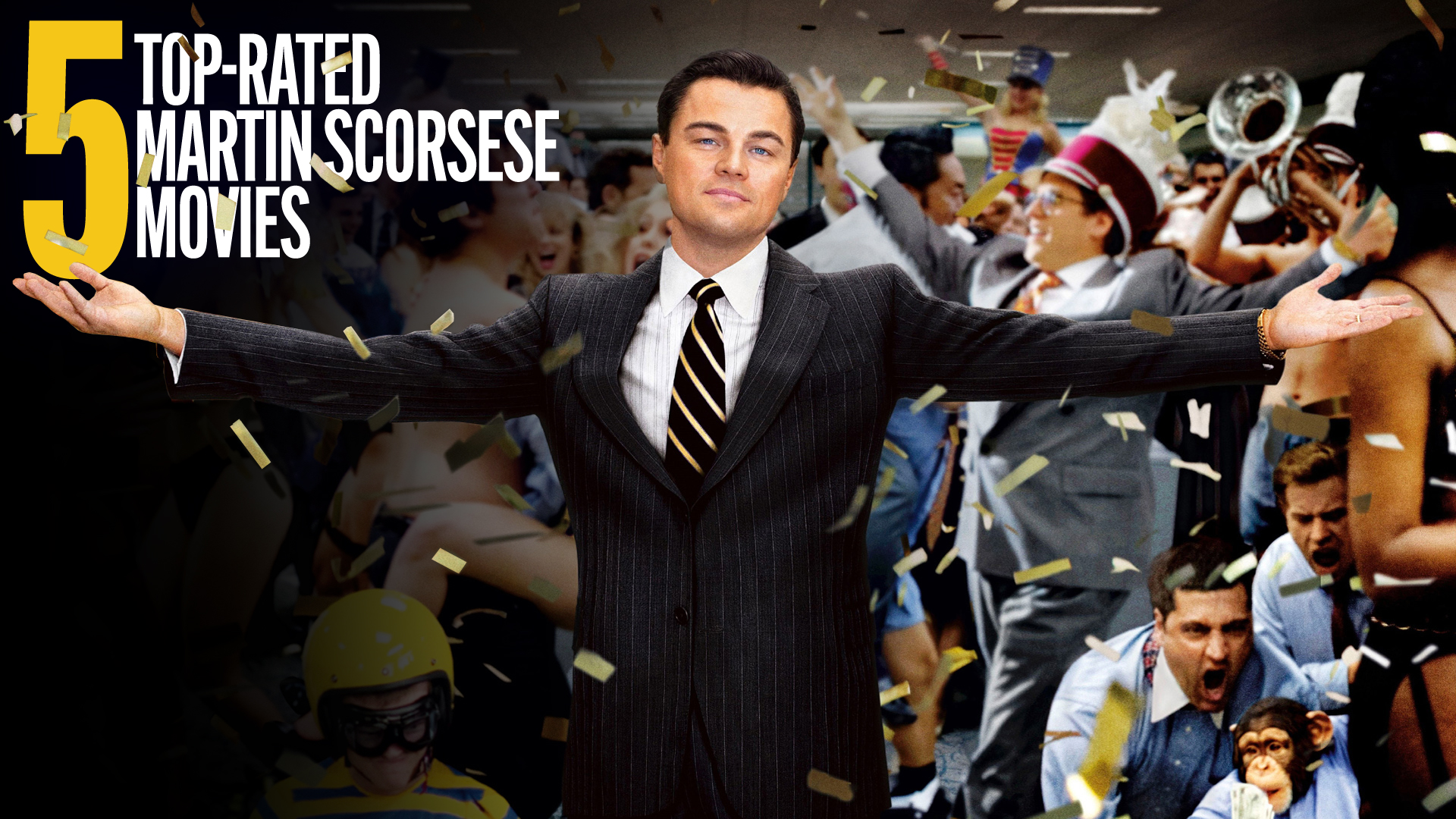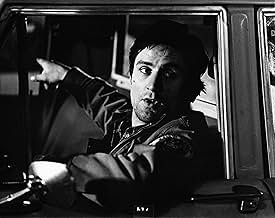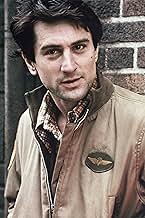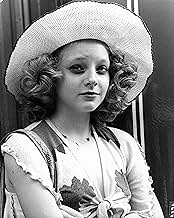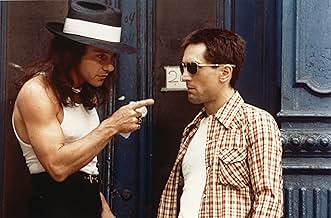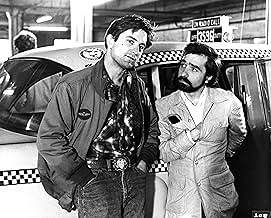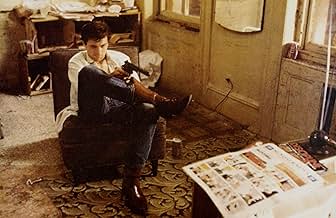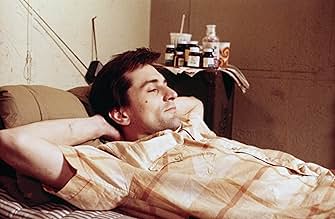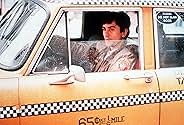A mentally unstable veteran works as a nighttime taxi driver in New York City, where the perceived decadence and sleaze fuels his urge for violent action.A mentally unstable veteran works as a nighttime taxi driver in New York City, where the perceived decadence and sleaze fuels his urge for violent action.A mentally unstable veteran works as a nighttime taxi driver in New York City, where the perceived decadence and sleaze fuels his urge for violent action.
- Nominated for 4 Oscars
- 22 wins & 21 nominations total
Diahnne Abbott
- Concession Girl
- (as Diahnne Abbot)
Victor Argo
- Melio
- (as Vic Argo)
- Director
- Writer
- All cast & crew
- Production, box office & more at IMDbPro
What Scorsese Film Ranks Highest on IMDb?
What Scorsese Film Ranks Highest on IMDb?
Cinema legend Martin Scorsese has directed some of the most acclaimed films of all time. See how IMDb users rank all of his feature films as director.
Storyline
Did you know
- TriviaRobert De Niro prepared for the role by working as a late night cab driver in New York City early 1975. One of his fares was a struggling actor who recognized him from The Godfather Part II (1974). The young actor said to De Niro discouragingly "Wait a minute, you just won an Oscar. My God... is it THAT hard to get work??"
- GoofsIn an earlier version, Iris's timekeeper discovers a weapon on Travis, disarms him, then returns it to him as he's leaving. The scene was edited out, but the gun is still in the timekeeper's hand when he looks at his watch.
- Quotes
Travis Bickle: Listen, you fuckers, you screwheads. Here is a man who would not take it anymore. A man who stood up against the scum, the cunts, the dogs, the filth, the shit. Here is a man who stood up! Here is...
- Crazy creditsThe original television version of the film featured the following disclaimer before the closing credits: "To our Television Audience: In the aftermath of violence, the distinction between hero and villain is sometimes a matter of interpretation or misinterpretation of facts. 'Taxi Driver' suggests that tragic errors can be made.- The Filmmakers."
- Alternate versionsOriginal UK cinema and video versions suffered a very brief 1 second sound cut to the scene where Iris unzips Travis's fly in the bedroom. The BBFC finally restored this cut in 1993.
- ConnectionsEdited into Aristokraticheskiy kinematograf: Episode #1.1 (2011)
Featured review
Travis Bickle is a Vietnam veteran who cannot sleep at night and just ends up travelling around. To try and use the time effectively he becomes a taxi driver. Things start to look up for him as he works nights and slowly starts to live a little bit. He meets a girl, Betsy, and arranges to see her a few times despite the fact that he is a little bit out of the ordinary a quality that seems to interest her. His connection to the night allows him to see young prostitute Iris being bullied by her pimp Matthew and he begins to see his role to perhaps save her him playing his part in cleaning up the sewer that he feels New York has become. However when his view of normal life puts Betsy off him he starts to retreat more and more into the night, looking for meaning in his life and growing more and more outraged by the world he is part of.
Hardly the most uplifting of films it is engaging and impressive and truly deserves the reputation it has. Martin Scorsese and Paul Schrader have produced a film that convincingly portrays a man cut out of society who has the slightest connection to normality before finding it eroded away. The script is brilliant because the detail is engaging but it is this descent into a very modern type of madness that drives the film forward. Travis has just enough about him that is recognisable that it makes it so easy to go along with the rest of his madness. A major part of this is getting the feeling right about living in a cesspit; a city that seems to have forgotten its way morally New York is the strongest example but elements of it could be parts of any city I suspect. In painting this world in such a real way, Scorsese has made Travis all the more convincing and, to a point, all the easier to follow in his fall. Like I said it is not a film to morally uplift you but one that is depressingly fair. There is no redemption in this modern world and although it appears that the violence at the end somehow redeems Travis in reality by showing "society" accepting his action it drags the rest of us down nearer the world that he hates and has become part of. I love King of Comedy for the same reason albeit in a different world.
Scorsese injects a real understanding of the place and a real sense of foreboding into even the earliest scenes. He inserts clever and meaningful shots into scenes that other directors might just have filmed straight and his choice of scene and shot compliments the script is depicting Travis descending into madness. What makes the film even better is De Niro showing the type of form that makes his recent form such a major disappointment. He is outstanding as he moves Travis from being relatively normal to being eaten up from the inside out. His eventual implosion is impressive but it is only as impressive as the gradual slide he depicts over the course of the film. Although he dominates it, others impress as well. Foster stands out in a small role, while Keitel makes a good impression as the pimp. Shepherd is not quite as good but her character was not as well written as the others so it isn't all down to her. Regardless, the film belongs to De Niro and although the quotable scenes are the ones that are remembered it is in the quieter moments where he excels and shows genuine talent and understanding.
Overall an impressive and morally depressing film that deserves its place in cinematic history. The portrayal of a city and a man slipping into moral insanity is convincing and engaging and it shows how well to "do" modern madness and the effects of the moral void of parts of society. Scorsese directs as a master despite this being at an early stage in his career and De Niro is chillingly effective as he simply dominates the film in quiet moments and quotable moments alike. I rarely use phrases like "modern classic" because I think they are lazy but this is one film that certainly deserves such a label.
Hardly the most uplifting of films it is engaging and impressive and truly deserves the reputation it has. Martin Scorsese and Paul Schrader have produced a film that convincingly portrays a man cut out of society who has the slightest connection to normality before finding it eroded away. The script is brilliant because the detail is engaging but it is this descent into a very modern type of madness that drives the film forward. Travis has just enough about him that is recognisable that it makes it so easy to go along with the rest of his madness. A major part of this is getting the feeling right about living in a cesspit; a city that seems to have forgotten its way morally New York is the strongest example but elements of it could be parts of any city I suspect. In painting this world in such a real way, Scorsese has made Travis all the more convincing and, to a point, all the easier to follow in his fall. Like I said it is not a film to morally uplift you but one that is depressingly fair. There is no redemption in this modern world and although it appears that the violence at the end somehow redeems Travis in reality by showing "society" accepting his action it drags the rest of us down nearer the world that he hates and has become part of. I love King of Comedy for the same reason albeit in a different world.
Scorsese injects a real understanding of the place and a real sense of foreboding into even the earliest scenes. He inserts clever and meaningful shots into scenes that other directors might just have filmed straight and his choice of scene and shot compliments the script is depicting Travis descending into madness. What makes the film even better is De Niro showing the type of form that makes his recent form such a major disappointment. He is outstanding as he moves Travis from being relatively normal to being eaten up from the inside out. His eventual implosion is impressive but it is only as impressive as the gradual slide he depicts over the course of the film. Although he dominates it, others impress as well. Foster stands out in a small role, while Keitel makes a good impression as the pimp. Shepherd is not quite as good but her character was not as well written as the others so it isn't all down to her. Regardless, the film belongs to De Niro and although the quotable scenes are the ones that are remembered it is in the quieter moments where he excels and shows genuine talent and understanding.
Overall an impressive and morally depressing film that deserves its place in cinematic history. The portrayal of a city and a man slipping into moral insanity is convincing and engaging and it shows how well to "do" modern madness and the effects of the moral void of parts of society. Scorsese directs as a master despite this being at an early stage in his career and De Niro is chillingly effective as he simply dominates the film in quiet moments and quotable moments alike. I rarely use phrases like "modern classic" because I think they are lazy but this is one film that certainly deserves such a label.
- bob the moo
- Feb 12, 2006
- Permalink
Details
- Release date
- Country of origin
- Languages
- Also known as
- Tài Xế Taxi
- Filming locations
- 87 Columbia Heights, Brooklyn, New York, USA(Travis is buying guns at an apartment in Brooklyn Heights)
- Production companies
- See more company credits at IMDbPro
Box office
- Budget
- $1,300,000 (estimated)
- Gross US & Canada
- $28,262,574
- Opening weekend US & Canada
- $116,458
- Feb 19, 1996
- Gross worldwide
- $28,580,862
Contribute to this page
Suggest an edit or add missing content





